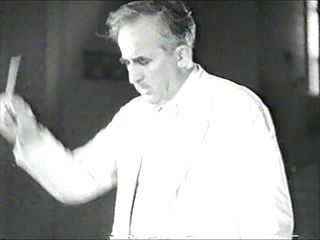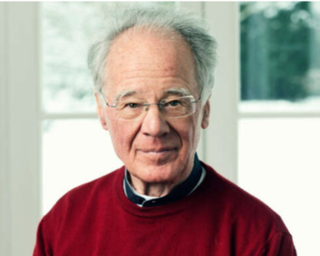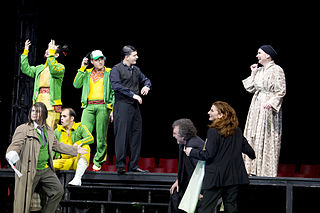Related Research Articles

Alban Maria Johannes Berg was an Austrian composer of the Second Viennese School. His compositional style combined Romantic lyricism with the twelve-tone technique. Although he left a relatively small oeuvre, he is remembered as one of the most important composers of the 20th century for his expressive style encompassing "entire worlds of emotion and structure".

Erich Kleiber was an Austrian, later Argentine, conductor, known for his interpretations of the classics and as an advocate of new music.

The Staatsoper Unter den Linden, also known as the Berlin State Opera, is a listed building on Unter den Linden boulevard in the historic center of Berlin, Germany. The opera house was built by order of Prussian king Frederick the Great from 1741 to 1743 according to plans by Georg Wenzeslaus von Knobelsdorff in the Palladian style. Damaged during the Allied bombing in World War II, the former Royal Prussian Opera House was rebuilt from 1951 to 1955 as part of the Forum Fridericianum square. Nicknamed Lindenoper in Berlin, it is "the first theater anywhere to be, by itself, a prominent, freestanding monumental building in a city."

Wozzeck is the first opera by the Austrian composer Alban Berg. It was composed between 1914 and 1922 and first performed in 1925. The opera is based on the drama Woyzeck, which the German playwright Georg Büchner left incomplete at his death. Berg attended the first production in Vienna of Büchner's play on 5 May 1914, and knew at once that he wanted to base an opera on it. From the fragments of unordered scenes left by Büchner, Berg selected 15 to form a compact structure of three acts with five scenes each. He adapted the libretto himself, retaining "the essential character of the play, with its many short scenes, its abrupt and sometimes brutal language, and its stark, if haunted, realism..."

Mathis der Maler is an opera by Paul Hindemith. The work's protagonist, Matthias Grünewald, was a historical figure who flourished during the Reformation, and whose art, in particular the Isenheim Altarpiece, inspired many creative figures in the early 20th century.

Clemens Heinrich Krauss was an Austrian conductor and opera impresario, particularly associated with the music of Richard Strauss, Johann Strauss and Richard Wagner.

Manfred Gurlitt was a German opera composer and conductor. He studied composition with Engelbert Humperdinck and conducting with Karl Muck. He spent most of his career in Japan.

Gerd Albrecht was a German conductor.
The Yomiuri Nippon Symphony Orchestra is a Japanese symphony orchestra administratively based in Tokyo. The orchestra primarily performs concerts in Tokyo at the Suntory Hall, but also gives concerts at the Tokyo Opera City Concert Hall. The orchestra also performs in Yokohama at the Yokohama Minato Mirai Hall.

George Alexander Albrecht was a German conductor and composer, who also worked as a musicologist and academic teacher. A prolific composer at a young age, he was Generalmusikdirektor (GMD) of the Staatsoper Hannover from 1965 for 30 years, where he led not only the major operas by Mozart and stageworks by Wagner, but contemporary composers, such as Aribert Reimann's Troades in 1987. He was GMD of the Nationaltheater Weimar from 1996, and taught at the Hochschule für Musik Franz Liszt, Weimar. Albrecht promoted the works of neglected composers such as Wilhelm Furtwängler, Hans Pfitzner, and Erwin Schulhoff.
Caspar Neher was an Austrian-German scenographer and librettist, known principally for his career-long working relationship with Bertolt Brecht.
Gabriele Schreckenbach is a German contralto singer in opera and concert and an academic voice teacher.
Barbara Scherler is a German classical mezzo-soprano and contralto singer in opera and concert. She was a member of the Deutsche Oper Berlin and active in performances and recordings of operas of the 20th century.

Franz Grundheber is a German operatic baritone. At the Hamburg State Opera, he performed over 150 roles from 1966. His voice is flexible enough to sing Italian opera as well as Wagner roles and contemporary opera; he is a stage presence in acting and singing. He has performed at major international opera houses and is known for his performance of the title role of Alban Berg's Wozzeck, filmed for DVD in 1994 in a production staged by Patrice Chéreau.
Gerd Nienstedt was a German and Austrian opera singer, bass and bass-baritone. After an international career at major opera houses and the Bayreuth Festival, he was also a theatre director, stage director and academic voice teacher.
Wozzeck is a 1925 opera by Alban Berg, based on the play Woyzeck by Georg Büchner.
Martin Abendroth was a German opera singer (bass-baritone) and voice teacher.

Johannes Schüler was a German conductor who held leading positions at opera houses such as the Berlin State Opera and the Staatsoper Hannover. He promoted contemporary music, leading the world premieres of Alban Berg's Three Pieces for Orchestra in 1930, and Henze's Boulevard Solitude in 1952.
Rudolf Hindemith, since 1951 officially Paul Quest, pseudonym Hans Lofer was a German cellist, composer and conductor. He was solo cellist of the Vienna State Opera, and played chamber music in the Amar Quartet. He stood often in the shadow of his famous brother Paul but was rediscovered in recent years as a composer of an opera, a piano concerto, chamber music and piano pieces.
Wolfgang Wengenroth is a German conductor.
References
- ↑ Opera News Volume 61, Issues 9-17 -1997 Page 12 "Manfred Gurlitt, a composer from Berlin, was working on a Wozzeck opera at roughly the same time, and it was, and it was produced in Bremen in 1926, a year after Berg's Wozzeck. Gurlitt's intelligent, daring response to Buchner's staccato dramaturgy — one gets the impression that Buchner was writing screenplays ninety years ahead of time — was to write a series of musical scenes, separated by silences and not ordered into larger structural units, i.e. acts."
- ↑ Christopher Hailey Alban Berg and His World 1400836476 2010 p20 "In a letter to Erich Kleiber he wrote, “I've already had a look at the piano vocal score of the Gurlitt Wozzeck. I am objective enough to be able to say that it's not bad or unoriginal—but I'm also objective enough to see that the broth in the kettle of this opera, that is, in the orchestra, is too watered down, even for 'poor folks' [arme Leut'].." ..Gurlitt's opera, with its lean, simplified textures and stylistic heterogeneity, is far less emotionally manipulative and much more in keeping with the aesthetic of the 1920s one hears in the music of such contemporaries as Hindemith or Kurt Weill.